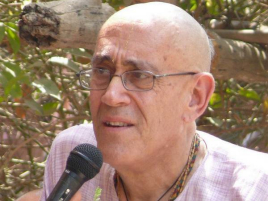Remembering Gopiparanadhana Prabhu
By Dravida Dasa | Sep 22, 2011

I was shocked to learn this morning that my old friend and colleague Gopiparanadhana Prabhu had left his body suddenly at Govardhana. Just a few days ago I sent him a chapter of his Laghu-bhagavatamrta translation I had been reviewing — and now he’s gone. What a loss for our Society and the world! He was a pure and vastly learned Vaisnava who impressed everyone with his firm faith in and loyalty to Srila Prabhupada and his movement, his genuine humility, his warm and open personality, and his deep realization of the intricacies of bhakti. Though we mourn his departure, we rejoice at the auspicious circumstances of his passing — at the foot of Govardhana Hill chanting japa.
Gopiparanadhana Prabhu (or “Gopi,” as he was known to his close friends) joined the famous Henry St. temple in Brooklyn in 1973, the same year I did. We came from a similar background — New York Jewish intellectual. We even both played the recorder, a simple renaissance-era flute. (In fact, we used to occasionally play duets in Miami during slow times in the production of the Bhagavatam.) Of course, he was a real scholar, with a degree in linguistics from Columbia, while I wasn’t. But still, we both began serving in Srila Prabhupada’s Bhaktivedanta Book Trust the year we joined, and have done so for nearly 40 years since.
My main close association with Gopi was during the 6 years from 1983-89 in Miami, when we worked with Hridayananda das Goswami on the completion of Srila Prabhupada’s Bhagavatam. Gopi really did tremendous work on that project, translating the verses and commentaries for most of the 10th, 11th, and 12th cantos, text that formed the basis for Maharaj to do his translations and purports. In fact, in 1989 Maharaj was not able to participate in producing the final 10 chapters of the Tenth Canto — the final canto in our production line — and Gopi did those all himself. Read the 87th chapter, the Prayers of the Personified Vedas, to get a further view of his brilliance, which he showed in distilling the purports from the extensive commentaries of the acaryas.
Over the years since Miami I’ve only occasionally had Gopi’s personal association, but I’ve followed his career from afar, appreciating his wonderful development of the Sanskrit school at Govardhana, his superb translation with commentary of the Brhad-bhagavatamrta, and his preaching in China and other places. And, whenever I had questions on the Sanskrit in Prabhupada’s books or other books, he was always there at the other end of the email. Hopefully his two main books that are nearing publication – Srila Jiva Gosvami’s Tattva-sandarbha and Srila Rupa Goswami’s Laghu-bhagavatamrta — can soon be brought out posthumously.
Gopi, you will be sorely missed by thousands, including your old friend,
Dravida Dasa















